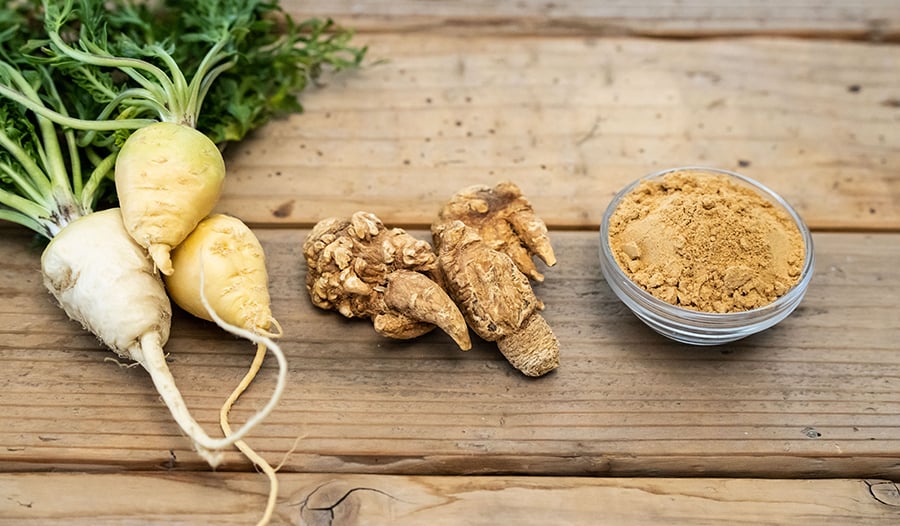What Are Adaptogens? Discover Nature's Stress-Relief Superstars

Adaptogens have been used for centuries to help the body adapt to stress and maintain balance. Adaptogens work by supporting the body's stress response system, allowing it to regulate cortisol levels and promote homeostasis, which can be achieved when our bodies are in a healthy balance both mentally and physically.
Read on to learn more about the benefits of adaptogens, how they work, the most popular adaptogens, and how to incorporate them into your daily routine.
What Are Adaptogens?
Adaptogens are herbs and plants that help the body handle physical, emotional, or environmental stress. Unlike stimulants or sedatives, they support the body’s natural stress response, promoting balance and resilience.
Think of your body as a finely tuned machine. When faced with stress, this system must adjust and respond appropriately. Adaptogens act as a gentle guide, helping your body navigate these challenges with grace and efficiency. They do not force your body into a specific state but rather empower it to find its own equilibrium.
Benefits of Adaptogens
By supporting the body's stress response system, adaptogens offer the following benefits.
Balance Cortisol Levels
Unbalanced cortisol levels can lead to various health problems, including anxiety, insomnia, and weight gain. Stress management with adaptogens can help to regulate cortisol production, promoting a sense of calm and balance.
Improve Mood
Adaptogens can help to boost mood and reduce feelings of anxiety and depression. By supporting the body's natural stress response, they can help to create a more positive and resilient mindset.
Enhance Cognitive Function
Adaptogens can help to improve cognitive function, including memory, focus, and concentration. By reducing stress and promoting mental clarity, adaptogens may help you feel more alert and productive.
Boost Energy
Adaptogens can help to increase energy levels and reduce fatigue. By supporting the body's natural processes, they can help you to feel more energized and capable of handling life's challenges.
Strengthen The Immune System
Adaptogens can help to strengthen the immune system, making the body better equipped to fight off illness and disease. By promoting overall health and well-being, they can help to keep you feeling your best.
Improve Sleep
Adaptogens can help regulate sleep patterns, leading to better quality sleep, reduced insomnia, improved mood, enhanced energy levels, and better overall health.
Enhance Athletic Performance
Some adaptogens, such as Rhodiola rosea and ginseng, may enhance athletic performance by improving endurance, reducing fatigue, and boosting energy levels. It can be particularly helpful for athletes and individuals who regularly engage in physical activity.
Balance Hormones
Adaptogens can help maintain hormonal balance, which is crucial for various functions, including metabolism, mood, and reproductive health. By regulating hormone levels, adaptogens can promote overall well-being.
Anti-Aging Properties
Some studies suggest that adaptogens may possess anti-aging properties, aiding in shielding the body from the effects of aging. This may include reducing oxidative stress, improving skin health, and supporting cognitive function. While more research is needed to fully understand the anti-aging benefits of adaptogens, early findings are promising.
8 Best Adaptogens
1. Ashwagandha
Renowned for its stress-reducing and immune-boosting properties, Ashwagandha is a versatile adaptogen that has been used for centuries in Ayurvedic medicine. Ayurvedic Medicine is an ancient Indian medicine that focuses on a more holistic approach to physical and mental health. It can help regulate cortisol levels, improve mood, and support overall well-being.
2. Ginseng
A popular adaptogen with a long history of use in traditional Chinese medicine, ginseng has been studied for its energy-boosting and cognitive-enhancing properties. It can help enhance focus, concentration, and mental clarity while also supporting the immune system.
3. Rhodiola Rosea
Rhodiola is a powerful adaptogen that is native to cold, mountainous regions and has been used for centuries to enhance endurance, reduce fatigue, and improve mood. Moreover, it can help regulate cortisol levels and support cognitive function.
4. Maca Root
A Peruvian root vegetable with a rich nutritional profile, maca root is a popular adaptogen for balancing hormones, increasing energy, and supporting fertility. Additionally, it can help improve mood, reduce anxiety, and enhance sexual function.
5. Licorice Root
A versatile adaptogen with anti-inflammatory and antiviral properties, licorice root is often used to soothe digestive issues, support the immune system, and reduce cortisol levels. In addition, it can help promote skin health and alleviate symptoms of allergies.
6. Holy Basil (Tulsi)
Known for its adaptogenic and anti-inflammatory properties, Holy Basil is a popular herb in Ayurvedic medicine. It can reduce stress, improve mood, and support the immune system.
7. Schisandra Berries
These bright red berries are a powerful adaptogen that can help boost energy, improve cognitive function, and support the liver. Schisandra berries are often used to treat fatigue, insomnia, and anxiety.
8. Reishi Mushroom
This medicinal mushroom has a long history of usage in traditional Chinese medicine; Reishi is believed to stimulate the immune system and reduce stress. What's more, it can improve sleep quality and support heart health.
How Adaptogens Work
Adaptogens work by influencing the body's stress response system, a complex network of physiological processes that help the body adapt to challenging situations. This system is primarily regulated by the hypothalamus-pituitary-adrenal (HPA) axis, a trio of endocrine glands that work together to produce cortisol, the primary stress hormone.
When the body is under stress, the hypothalamus, a small region of the brain, sends signals to the pituitary gland, which in turn stimulates the adrenal glands to release cortisol. Cortisol helps the body prepare for a fight-or-flight response by enhancing heart rate, blood pressure, and blood sugar levels. While cortisol is essential for survival in short-term stressful situations, consistently high levels of cortisol can have negative effects on health, including anxiety, insomnia, and impaired immune function.
Studies have shown that adaptogens can help regulate the HPA axis by modulating the release of cortisol. They may do this by:
- Reducing the sensitivity of the hypothalamus to stress signals. This can help prevent excessive cortisol production, even in the face of chronic stress.
- Enhancing the body's ability to metabolize cortisol can help reduce circulating cortisol levels and prevent its accumulation.
- Supporting the production of neurotransmitters that help to counter the effects of stress. These neurotransmitters, like serotonin and dopamine, can help improve mood, lower anxiety, and promote relaxation.
How Adaptogens Balance Hormones
Hormones are vital for regulating bodily functions like metabolism, mood, reproduction, and growth. When hormones are out of balance, it can lead to a range of health problems, including:
- Menstrual Irregularities: Irregular periods, heavy bleeding, or painful cramps
- Mood Swings: Anxiety, depression, irritability
- Weight Gain or Loss: Difficulty maintaining a healthy weight
- Infertility: Difficulty conceiving or carrying a pregnancy
- Hot Flashes and Night Sweats: Symptoms often associated with menopause
Adaptogens are known to support hormonal balance, especially for women dealing with imbalances caused by stress, aging, or other factors. Here’s how they can help:
- Reducing Stress Hormones: As mentioned earlier, adaptogens can regulate cortisol levels, the primary stress hormone. High cortisol levels can disrupt the body's hormonal balance, leading to symptoms like irregular periods and mood swings. By reducing stress hormones, adaptogens can help restore hormonal equilibrium.
- Supporting Adrenal Function: The adrenal glands play a critical role in hormone production, including cortisol and sex hormones. Adaptogens can help maintain adrenal gland health, ensuring the appropriate hormone levels are produced.
- Balancing Sex Hormones: Adaptogens regulate the production of sex hormones, such as estrogen and progesterone. This is especially crucial for women experiencing menopause when estrogen levels decrease. Adaptogens can also help reduce menopausal symptoms like hot flashes, night sweats, and mood swings.
- Improving Thyroid Function: The thyroid gland produces hormones that control metabolism and other bodily functions. Adaptogens can help support thyroid health by ensuring that the hormones are made in the correct amounts.
- Addressing Hormonal Imbalances: Adaptogens may help address specific hormonal imbalances, such as these conditions:
- Polycystic ovary syndrome (PCOS): Symptoms include irregular periods, excess hair growth, and acne
- Hypothyroidism: The thyroid gland doesn't produce enough thyroid hormone
- Hyperthyroidism: The thyroid gland generates an excessive amount of thyroid hormone
How To Get More Adaptogens
There are several ways to incorporate adaptogens into your daily routine:
- Supplements: Adaptogens are often available in supplement form, such as capsules, tablets, or powders. When choosing supplements, look for high-quality products from reputable brands.
- Herbal Teas: Many adaptogens can be enjoyed as herbal teas. Some popular options include ashwagandha and ginseng.
- Foods: Certain foods, such as maca and licorice root, contain natural adaptogens. You can incorporate these foods into smoothies, salads, or baked products.
- Topical Products: Some adaptogens can be found in topical products, such as creams and lotions. These products can help to relieve skin irritations, decrease inflammation, and improve overall skin health.
Tips For Using Adaptogens
Start Slowly
Start with a modest dose and gradually increase as needed.
Be Patient
Adaptogens may take several weeks to produce noticeable results.
Combine with Other Healthy Habits
For optimal benefits, combine adaptogen use with other healthy lifestyle habits, such as regular exercise, a balanced diet, and sufficient sleep.
The Bottom Line
Adaptogens are a safe and efficient way to reduce stress and enhance overall well-being. By supporting the body's stress response system and promoting balance, adaptogens can help you feel calmer, more focused, and more resilient.
If you're looking for a natural way to lower stress and improve your well-being, consider incorporating adaptogens into your daily routine.
References:
- Axe, Josh. "The Stress-Busting Power of Adaptogens." Dr. Axe, 13 Sept. 2021, draxe.com/nutrition/adaptogenic-herbs-adaptogens/.
- Chandrasekhar, K, et al. "A Prospective, Randomized Double-Blind, Placebo-Controlled Study of Safety and Efficacy of a High-Concentration Full-Spectrum Extract of Ashwagandha Root in Reducing Stress and Anxiety in Adults." Indian Journal of Psychological Medicine, vol. 34, no. 3, 2012, pp. 255–62, www.ncbi.nlm.nih.gov/pubmed/23439798, https://doi.org/10.4103/0253-7176.106022.
- Cohen, Marc Maurice. "Tulsi - Ocimum Sanctum: A Herb for All Reasons." Journal of Ayurveda and Integrative Medicine, vol. 5, no. 4, 2014, p. 251, www.ncbi.nlm.nih.gov/pmc/articles/PMC4296439/, https://doi.org/10.4103/0975-9476.146554.
- Hrefna Palsdottir, MS. "9 Benefits of Maca Root (and Potential Side Effects)." Healthline, Healthline Media, 30 Oct. 2016, www.healthline.com/nutrition/benefits-of-maca-root.
- Jin, Xingzhong, et al. "Ganoderma Lucidum(Reishi Mushroom) for Cancer Treatment." Cochrane Database of Systematic Reviews, 13 June 2012, https://doi.org/10.1002/14651858.cd007731.pub2.
- Liao, Lian-ying, et al. "A Preliminary Review of Studies on Adaptogens: Comparison of Their Bioactivity in TCM with that of Ginseng-like Herbs Used Worldwide." Chinese Medicine, vol. 13, no. 1, 16 Nov. 2018, www.ncbi.nlm.nih.gov/pmc/articles/PMC6240259/, https://doi.org/10.1186/s13020-018-0214-9.
- Olsson, Erik, et al. "A Randomised, Double-Blind, Placebo-Controlled, Parallel-Group Study of the Standardised Extract SHR-5 of the Roots OfRhodiola Roseain the Treatment of Subjects with Stress-Related Fatigue." Planta Medica, vol. 75, no. 02, 18 Nov. 2008, pp. 105–112.
- Panossian, Alexander, and Georg Wikman. "Pharmacology of Schisandra Chinensis Bail.: An Overview of Russian Research and Uses in Medicine." Journal of Ethnopharmacology, vol. 118, no. 2, July 2008, pp. 183–212, https://doi.org/10.1016/j.jep.2008.04.020.
- Rai, Deepak, et al. "Anti-Stress Effects of Ginkgo Biloba and Panax Ginseng: A Comparative Study." Journal of Pharmacological Sciences, vol. 93, no. 4, 2003, pp. 458–464, https://doi.org/10.1254/jphs.93.458.
- Thau, Lauren, et al. "Physiology, Cortisol." National Library of Medicine, StatPearls Publishing, 2023, www.ncbi.nlm.nih.gov/books/NBK538239/.
- Todorova, Velislava, et al. "Plant Adaptogens—History and Future Perspectives." Nutrients, vol. 13, no. 8, 20 Aug. 2021, p. 2861, https://doi.org/10.3390/nu13082861.
DISCLAIMER:This Wellness Hub does not intend to provide diagnosis...
















































































 Table of Contents
Table of Contents















